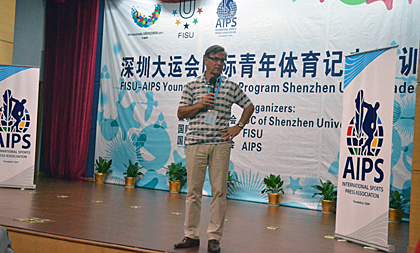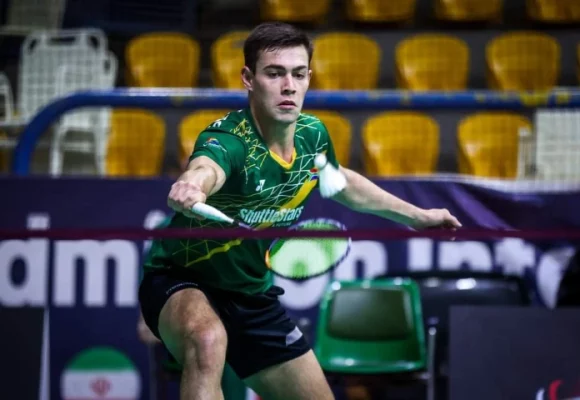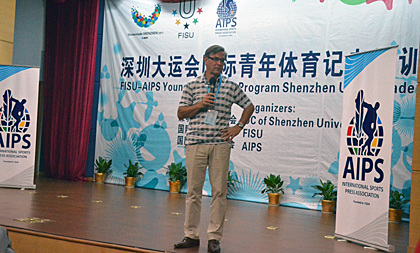 World Lotto President and former FISU EC member Risto Nieminen (C. Pierre/FISU)
World Lotto President and former FISU EC member Risto Nieminen (C. Pierre/FISU)
SHENZHEN – 700 million people watched the 2010 World Cup final between Spain and the Netherlands.
While the worldwide popularity of sport, not just football, is blatant, what most fail or maybe refuse to see is the dark side of that mass popularity. According to World Lottery Association (WLA) president Risto Nieminen, the mass commercialization of sport has given the world of organized crime a prime opportunity to take advantage of this popularity, mainly through match fixing.
And in today’s world where instant communication makes it possible to access information from across the globe in seconds, no sport is safe.
“Betting has become a global business, an online global business,” said Nieminen this morning, addressing the AIPS-FISU young journalists. “This is the fact today and [match fixing and corruption] happens everywhere. Let me guarantee to you, it happens everywhere.”
A historical case that has become synonymous with corruption in sport is that of the 1919 Chicago Black Sox. The team, influenced by organized crime members, agreed to throw the World Series in exchange for a share in the mafia’s betting winnings.
Today, however, match fixing and corruption in sport is not only much more common, it’s much more complicated.
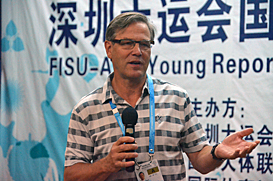 Risto Nieminen“It’s not like it was 100 years ago when it was one case here, one case there and a couple people made some extra money,” said Nieminen. “The FBI and Interpol say that sports today is the easiest place for money laundering in the world… because of the huge values that are connected with sports.”
Risto Nieminen“It’s not like it was 100 years ago when it was one case here, one case there and a couple people made some extra money,” said Nieminen. “The FBI and Interpol say that sports today is the easiest place for money laundering in the world… because of the huge values that are connected with sports.”
While Nieminen said the underground nature of illegal betting and match fixing makes it difficult to estimate just how great the monetary figures involved are, he said some have said it’s between $50-400 billion. And that’s just the money that goes in to bets.
Another key challenge for modern sports is the effect of information technology. Webcasting and live streaming have given rise to live online betting where gamblers can bet on anything from who will get the first corner kick in a soccer match to who will win the coin toss at the Super Bowl.
According to Nieminen, this is something that sports officials were not prepared for.
“There is not one sport that is safe because of internet,” he said. “People who are working in sports organizations today like FIFA, like in FIBA, they come with experience of the sport. They haven’t had any training or education concerning finance or commercial matters.”
Nieminen echoed the sentiments of people such as IOC president Jacques Rogge, who has said that corruption is the most damaging thing in sport today.
“[Corruption] might be the thing that is making us lose our belief in sports,” Nieminen said. “Instead of seeing two teams on the sports field that are actually doing their best for their teams, they have another agenda…. We get to the point where athletes at every level think that match fixing is something that is natural.”
The fight against corruption in sport has come to rely on three pillars: awareness and ethical codes, mentoring and legislation.
According to Nieminen, most countries have no legislation that makes something like match fixing illegal. He therefore stressed the need for different sports organizations and national governments alike to develop regulations that would bring about harsher punishment for anyone caught match fixing.
There have also been initiatives such as anonymous tip lines for players who have been approached by organized crime syndicates, while the International Criminal Police Organization (Interpol) has begun working with associations such as FIFA because sports has become such a large arena for mafia activity.
However, Nieminen said that, for a multitude of reasons, all that can be done in the near future is set up conditions that make it difficult for match fixing to occur.
“You basically have to have someone prove in the court, to tell what was really happening and when you’re dealing with organized crimes, they’re ready to get rid of those witnesses,” he said.
Another barrier is the fact that most people who are interested in sports want desperately to believe in their purity. This becomes a particular problem for journalists, because according Nieminen; readers don’t want to hear about match fixing scandals.
“We have to defend the value of sport because it is our future,” said AIPS president Gianni Merlo. “Remember, the most important thing to remember is our honesty.”
(Source: Justin Fauteux, FISU Young Reporter/Canada)

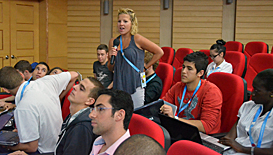 Lots of Questions for the Lotto Boss – in this photo Kelsey Wingerak (CAN)
Lots of Questions for the Lotto Boss – in this photo Kelsey Wingerak (CAN)
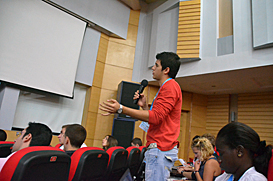 Alejandro Bendaña (Nicaragua)
Alejandro Bendaña (Nicaragua)
FISU President addresses Young Reporters
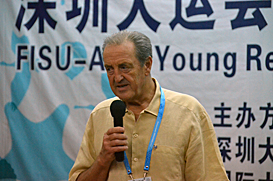 FISU President Gallien
FISU President Gallien
Present at today’s YRP session was FISU President Claude-Louis Gallien, who addressed the young reporters and wished them luck with their activities at the Universiade. ‘FISU is behind this program all the way’, Mr. Gallien said. ‘We will continue are efforts to bring your journalists to the future Universiades. It’s a great learning opportunity and FISU is more than sport , it’s also education and culture.’
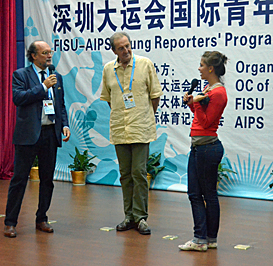 Natasha from Costa Rica explains the YR video project to the FISU President
Natasha from Costa Rica explains the YR video project to the FISU President
(Photos: C. Pierre/FISU)

